

Know Your Sources. When doing research you will come across a lot of information from different types of sources. How do you decide which source to use? From tweets to newspaper articles, this tool provides a brief description of each and breaks down 6 factors of what to consider when selecting a source. A platform for millions of very short messages on a variety of topics that enables brief dialogue between distinct groups of people across geographic, political, cultural and economic boundaries. An avenue for sharing both developed and unpolished ideas and interests with a niche community with relative ease. A collection of millions of educational, inspirational, eye-opening and entertaining videos that are shared rapidly and widely. A reporting and recording of cultural and political happenings that keeps the general public informed of daily events, sports, and current news. A book in which the information presented is supported by clearly identified sources.
Total Number Published per Day Time in review. Advocacy Group: Is Google Too Powerful for Its Own Good?: Associations Now. Google is one of the most influential companies in the world, and according to one big-name consumer advocacy group, its reach is getting so broad that it may be tough to rein in its power.
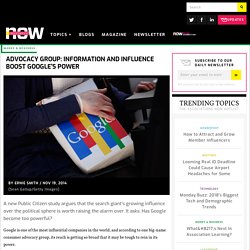
In a new report, “Mission Creep-y” [PDF], Public Citizen argues that the sheer amount of information Google amasses—from user emails, by scanning books, through searches, and using other means—is cause for concern, especially because of the company’s increasing political clout. “Most Google users are likely aware that Google collects information about them, such as their internet surfing practices,” the report states. This Is “Your Brain on the Internet” on the Internet. For an hour and a half on this delicate fall Sunday, a group of us valiantly took our brains off the Internet to attend “Your Brain on the Internet.”
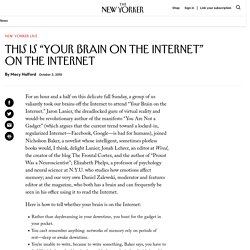
Jaron Lanier, the dreadlocked guru of virtual reality and would-be revolutionary author of the manifesto “You Are Not a Gadget” (which argues that the current trend toward a locked-in, regularized Internet—Facebook, Google—is bad for humans), joined Nicholson Baker, a novelist whose intelligent, sometimes plotless books would, I think, delight Lanier; Jonah Lehrer, an editor at Wired, the creator of the blog The Frontal Cortex, and the author of “Proust Was a Neuroscientist”; Elizabeth Phelps, a professor of psychology and neural science at N.Y.U. who studies how emotions affect memory; and our very own Daniel Zalewski, moderator and features editor at the magazine, who both has a brain and can frequently be seen in his office using it to read the Internet.
Here is how to tell whether your brain is on the Internet: This Is Your Brain on the Internet (Maybe) Google Has Picked an Answer for You—Too Bad It’s Often Wrong. Metzger&Flanagin,2013(JoP) How Much of the Internet Is Hidden? - Seeker - Video. Related on TestTube:Who Created the Internet?
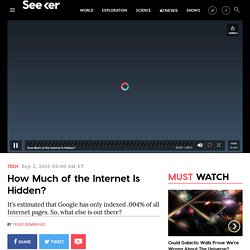
How Do Conspiracy Theories get started? Each week on TestTubePlus, we cover one topic from multiple angles and perspectives, and this week Trace tackles something most of us take for granted but dominates our lives: the internet. Yesterday, he went over what exactly the internet is and how it works. Today, he's going to try and figure out: exactly how big is the internet, and how much of it is hidden from search engines? As discussed yesterday, when the internet first came online back in 1969, it consisted of just four computers. So what is happening on the other 99.996 percent of the internet? TestTube Plus is built for enthusiastic science fans seeking out comprehensive conversations on the geeky topics they love. Learn More: How Big Is The Internet? How The Deep Web Works (How Stuff Works)"About 40 percent of the world's population uses the Web for news, entertainment, communication and myriad other purposes [source: Internet World Stats].
How We Think: John Dewey on the Art of Reflection and Fruitful Curiosity in an Age of Instant Opinions and Information Overload. Decades before Carl Sagan published his now-legendary Baloney Detection Kit for critical thinking, the great philosopher, psychologist, and education reformer John Dewey penned the definitive treatise on the subject — a subject all the more urgently relevant today, in our age of snap judgments and instant opinions.
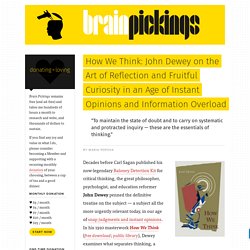
In his 1910 masterwork How We Think (free download; public library), Dewey examines what separates thinking, a basic human faculty we take for granted, from thinking well, what it takes to train ourselves into mastering the art of thinking, and how we can channel our natural curiosity in a productive way when confronted with an overflow of information. Dewey begins with the foundation of reflective thought, the defining quality of the fruitful, creative mind: Such thoughts grow up unconsciously and without reference to the attainment of correct belief.
They are picked up — we know not how. Googlethink - Nicholas Carr. Jacob Thomas I type the letter p into Google’s search box, and a list of 10 suggested keywords, starting with pandora and concluding with people magazine, appears just beneath my cursor.
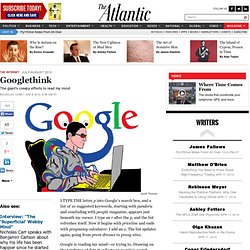
I type an r after the p, and the list refreshes itself. How Trigger Warnings Are Hurting Mental Health on Campus. Something strange is happening at America’s colleges and universities.
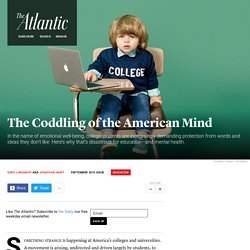
A movement is arising, undirected and driven largely by students, to scrub campuses clean of words, ideas, and subjects that might cause discomfort or give offense. Last December, Jeannie Suk wrote in an online article for The New Yorker about law students asking her fellow professors at Harvard not to teach rape law—or, in one case, even use the word violate (as in “that violates the law”) lest it cause students distress.
In February, Laura Kipnis, a professor at Northwestern University, wrote an essay in The Chronicle of Higher Education describing a new campus politics of sexual paranoia—and was then subjected to a long investigation after students who were offended by the article and by a tweet she’d sent filed Title IX complaints against her. In June, a professor protecting himself with a pseudonym wrote an essay for Vox describing how gingerly he now has to teach. Wikipedia and the Shifting Definition of 'Expert' - Rebecca J. Rosen. The expert is dead!
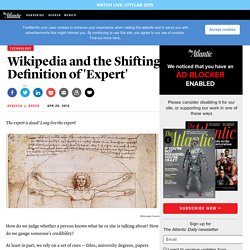
Long live the expert! Wikimedia Commons How do we judge whether a person knows what he or she is talking about? Volume 14, No. 1 (Spring 2012) - Why Google Isn’t Making Us Stupid…or Smart - Chad Wellmon. The Hedgehog Review: Vol. 14, No. 1 (Spring 2012) Reprinted from The Hedgehog Review 14.1 (Spring 2012).

This essay may not be resold, reprinted, or redistributed for compensation of any kind without prior written permission. Please contact The Hedgehog Review for further details. Information Overload Is Not a New Problem. There is a wonderful essay in The Hedgehog Review about the promise and perils of information overload.

Titled Why Google Isn’t Making Us Stupid…or Smart, this essay written by Chad Wellmon explores the history of information overload and explores its implications. Listen. » Living in a Digital World: Rethinking Peer Review, Collaboration, and Open Access Journal of Digital Humanities. Sheila Cavanagh It’s no secret that times are tough for scholars in the humanities.
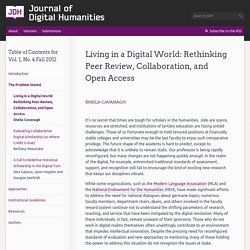
Jobs are scarce, resources are stretched, and institutions of tertiary education are facing untold challenges. Those of us fortunate enough to hold tenured positions at financially stable colleges and universities may be the last faculty to enjoy such comparative privilege. The future shape of the academy is hard to predict, except to acknowledge that it is unlikely to remain static. Our profession is being rapidly reconfigured, but many changes are not happening quickly enough.
Failure to redress current circumstances would have serious consequences for the humanities. Is Google Making Us Stupid? Illustration by Guy Billout "Dave, stop. Stop, will you? Stop, Dave. Will you stop, Dave?” So the supercomputer HAL pleads with the implacable astronaut Dave Bowman in a famous and weirdly poignant scene toward the end of Stanley Kubrick’s 2001: A Space Odyssey.
I can feel it, too. I think I know what’s going on. The Networking of Knowledge and Storytelling: David Weinberger for the Future of StoryTelling 2012. Why can’t we read anymore? Spending time with friends, or family, I often feel a soul-deep throb coming from that perfectly engineered wafer of stainless steel and glass and rare earth metals in my pocket. Touch me. Look at me. You might find something marvellous. This sickness is not limited to when I am trying to read, or once-in-a-lifetime events with my daughter. Steven Pinker and the Internet. As someone who has enjoyed and learned a lot from Steven Pinker’s books about language and cognition, I was disappointed to see the Harvard psychologist write, in Friday’s New York Times, a cursory op-ed column about people’s very real concerns over the Internet’s influence on their minds and their intellectual lives.
Pinker seems to dismiss out of hand the evidence indicating that our intensifying use of the Net and related digital media may be reducing the depth and rigor of our thoughts. He goes so far as to assert that such media “are the only things that will keep us smart.” And yet the evidence he offers to support his sweeping claim consists largely of opinions and anecdotes, along with one very good Woody Allen joke.
One thing that didn’t surprise me was Pinker’s attempt to downplay the importance of neuroplasticity. In Adapting Minds, his epic critique of the popular brand of evolutionary psychology espoused by Pinker and others, David J. Resisting the Kindle - Sven Birkerts. "Expertise and Authority in an Age of Crowdsourcing," in Not Just Where to Click: Teaching Students How to Think about Information. Ed. Troy Swanson; Heather Jagman, 191-215. Chicago: Association of College and Research Libraries, 2015.
Paper Versus Pixel - Issue 4: The Unlikely. On the occasion of the inaugural Nautilus Quarterly, we asked Nicholas Carr to survey the prospects for a print publication. Here he shows why asking if digital publications will supplant printed ones is the wrong question. How you'll get organized: four glimpses of a future without information overload - Opposing Viewpoints in Context. IN the late 1970s, I was thrilled by the ability to send and receive messages through the revolutionary medium then known as "electronic mail. " At about the same time, I began to write my letters, notes, articles, and books--we didn't yet call all such things "documents"--on a computer and store them electronically rather than on cards or papers stuffed into filing cabinets.
Interview with Clay Shirky, Part I. Clay Shirky teaches at the Interactive Telecommunications program at New York University and is the author, most recently, of Here Comes Everybody, about how new means of communication are changing the social environment. Does the Internet Make You Smarter? The Filter Bubble. Online Personalization Creates Echo Chamber to Affirm Biases. Could This Be The Most Upworthy Site In The History Of The Internet? Eli Pariser: Beware online "filter bubbles" Automation Makes Us Dumb. Artificial intelligence has arrived. Today’s computers are discerning and sharp.
They can sense the environment, untangle knotty problems, make subtle judgments and learn from experience. “Is Google Making Us Stupid?”(Britannica Forum: Your Brain Online) Why Abundance is Good: A Reply to Nick Carr. Neil Postman on "Informing Ourselves to Death" Book Review: ‘Words Onscreen’ by Naomi S. Baron. The Organised Mind: thinking straight in the age of information overload.
Clay Shirky: How cognitive surplus will change the world. Sherry Turkle: Connected, but alone?